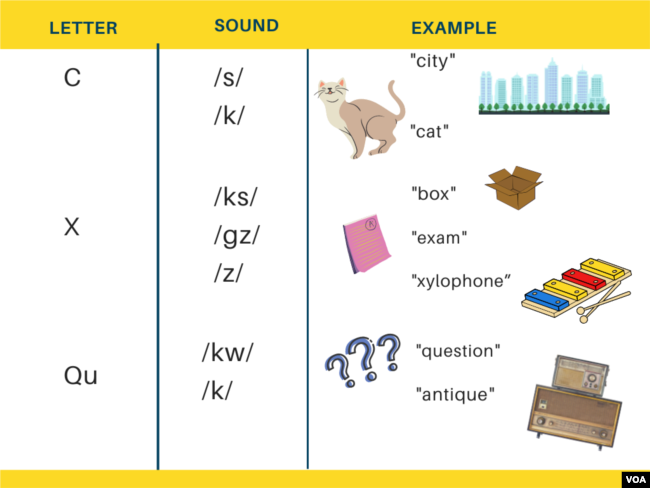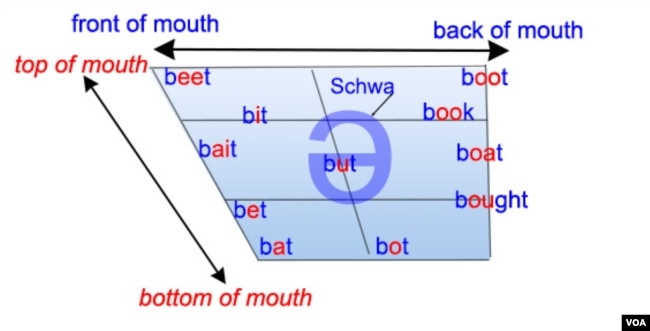英語のスペルと発音について
ちょうど先日、授業で発音を取り上げたばかりです。
Native speaker のPhonics ・ Non-nataive speaker 向きのPhonetic symbolsのアプローチ。
Vowelの特に”ア”の音。
Consonantの日本語にはない音。
Syllableの重要性、などです。
今回もVOAで英語を楽しく学びましょう!!
英語のスペルはなぜ難しいのか(和訳)
Why Spelling in English Is so Difficult
June 12,2022
先日、14歳のハリニ・ローガンさんが、米国のScripps National Spelling Bee(スクリップス・ナショナル・スペリング・ビー)で優勝しました。彼女は90秒間のスペルオフの間に22の単語を正しく綴ったのです。
その中には、phreatophyte(水晶体)、excimer(エキシマ)、saccharose(サッカロース)、そして最後に勝利した "moorhen"、雌の赤いライチョウの鳥の意、という単語が含まれていました。
しかし、ほとんどのアメリカ人は、これらの単語のどれをとっても、スペルを覚えるのは難しいでしょう。
英語を母国語とする人たちは、幼い頃から単語の発音と綴りに明確な違いがあることを知っています。しかし、この違いが主要言語の中で英語だけであることは知らないのです。
イタリア語やフィンランド語などは、アルファベットの1文字が1つの音に対応しているため、より簡単に綴ることができるのです。これらの言語を学ぶ学生は、1年目から読解の精度が90パーセントになることもあります。この情報は、British Journal of PsychologyのPhilip Seymoreによるものです。
英語では、アルファベットの多くの文字が2つ以上の音を持っています。そのため、何年も学習した後でも、英語の生徒の読解力は、イタリアやフィンランドの生徒よりはるかに低いのです。
英語の歴史
英語はゲルマン系の言語として始まりました。特に文法や基本的な語彙において、ドイツ語やオランダ語と最も密接な関係にあります。
12世紀のノルマン人の侵攻の際、古英語が話されていたが、政府や法律関係の書類にはフランス語が使われていました。そして、宗教活動や教育活動ではラテン語が使われました。その結果、より多くのフランス語やラテン語が英語に入ってきたのです。
1400年代後半に印刷機が発明されました。これによって英語の綴りが確立され、英語の話し言葉と書き言葉の結びつきが強まったのです。今の英語は、その時の言語の書き方です。
しかし、1500年代に入ると、特にイングランド南部では、長母音の発音がすべて変わり、話し言葉が変化し始めました。
例えば、"bite "という単語は、1400年には "beet "に近い発音をしていましたが、年月を経て現在の音に変化していきました。その結果、英語は古い綴りを持ちながら、新しい音を持つようになったのです。
1つの文字で多くの音
英語には26のアルファベットがありますが、話し言葉のバリエーションによって、44以上の音があります。
また、1つの文字だけでいくつかの音が表現されるものもあります。
例えば、"C "は "city "のように "S "に聞こえることもあります。また、"cat "のように "K "のように聞こえることもあります。
さらにそんなに難しくなければ、"X "を "box "の "ks/"、"exam "の "gz/"、"xylophone "の "z/"として発音してみましょう。
母音の音はたくさんある
英語のアルファベットには、5~6個の母音文字しかありません。A、E、I、O、U、そして時にはYもあります。でも、その音には20通りもあるんです! 例えば、英語の「oo」は、「boot」のように「/u/」と発音したり、「book」のように「ʊ」と発音することがあります。
これらの音は、空気が口やのどを自由に動くことで形成されます。言語学と呼ばれる言語の研究では、教師は図面を使って口の中を表現し、どこで母音が形成されるかを示します。
中央にあるのは、最も一般的な母音である "uhhh "の音です。最もリラックスした、自然な音です。舌や喉にほとんど力を入れずに音を出すことができます。
ブライアン・M・シエトセマ氏はScripps National Spelling BeeのAssociate Pronouncerです。彼は、"uhhh "という音はほとんど力を使わずに発音できるため、しばしば発音に入り込んでいると指摘します。
例えば、"please "という単語は、注意を引こうとすると "PUH-lease "になってしまうことがよくあるそうです。
これも、英語のスペルが難しい理由の一つです!
Why Spelling in English Is so Difficult
Recently, 14-year-old Harini Logan won the Scripps National Spelling Bee in the United States. She correctly spelled 22 words during a 90-second spell-off.
The words included phreatophyte, excimer, saccharose, and finally the winning word “moorhen,” which means a female, red grouse bird.
Most Americans, however, would find it difficult to spell any of these words!
From an early age, native English speakers know there are clear differences between how words are pronounced and how they are spelled. But they do not know that the difference is unique to English among major languages.
Languages like Italian or Finnish can be spelled more easily because each letter of the alphabet matches to one sound. Students studying these languages can have 90 percent reading accuracy after the first year. That information comes from Philip Seymore in the British Journal of Psychology.
In English, many letters of the alphabet have two or more sounds. This is why even after years of learning, students of English are still far below Italian or Finnish students in reading accuracy.
History of the English language
English started as a Germanic language. It is most closely connected to German and Dutch, especially in grammar and basic vocabulary.
During the Norman invasion in the 12th century, Old English was spoken but French was used in government and legal documents. And Latin was used in religious and educational activities. As a result, more French and Latin words entered the English language.
The printing press was invented in the late 1400s. This helped to establish English spelling and strengthen the connection between how English is spoken and how it is written. The English of today is how the language was written at the time.
However, the spoken language started to change in the 1500s with the pronunciation of all long vowels, especially in southern England.
For example, the word “bite” was pronounced closer to “beet” in 1400, before changing through the years to its current sound. The effect was that the English language had old spellings, but new sounds.
One letter, many sounds
English has 26 letters in the alphabet, but over 44 individual sounds depending on the variation of spoken English.
There are several sounds represented by only one letter.
For example, the letter "C" can sound like an “S” as in “city.” And it also sounds like a “K” as in “cat.”
If that is not hard enough, let’s try to pronounce the letter “X” as /ks/ in “box”, as /gz/ in “exam” and just /z/ in “xylophone."
So many ways to sound a vowel
There are only 5 or 6 vowel letters in the English alphabet. They include A, E, I, O, U, and sometimes Y. But there are 20 different ways to sound them! For example, a double “o” sound in English can be pronounced as /u/, as in the word “boot” or /ʊ/ as in the word “book”.
These sounds are formed by air moving through the mouth and throat freely. In the study of language, called linguistics, teachers use a drawing to represent the mouth and show where vowels are formed.
At the center is the most common vowel sound of “uhhh.” It is the most relaxed and natural sound. It takes almost no effort of the tongue or throat to create the sound.
Brian M. Sietsema is an Associate Pronouncer for the Scripps National Spelling Bee. He observes that since it takes little effort, the sound “uhhh” often makes its way into pronunciations.
For example, the word “please” often turns into “PUH-lease” when someone is trying to call attention.
This is another reason why spelling in English is so difficult!
Words in This Story
unique – adj. used to say that something or someone is unlike anything or anyone else
accuracy – n. the ability to work without making mistakes
printing press – n. a machine that prints books, newspapers, magazines, and similar materials in large numbers
vowels – n. speech sounds made with your mouth open and your tongue in the middle of your mouth not touching your teeth, lips, etc.
consonants – n. a speech sound (such as /p/, /d/, or /s/) that is made by partly or completely stopping the flow of air breathed out from the mouth


